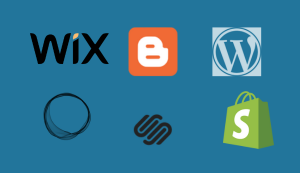WordPress? Wix? Something Else? We’ll Break It Down.
So, you’re ready to start your blog. You’ve got your niche, you’ve brainstormed some catchy names, and now you’re staring into the abyss of blog platforms like a deer in digital headlights.
WordPress? Wix? Squarespace? Blogger?
Too many options, right? Don’t worry—I’ve got your back.
In this guide, we’ll break down the most popular blogging platforms, who they’re best for, the pros and cons of each, and how to choose the best one for your goals (and budget). Whether you’re tech-savvy or allergic to code, there’s a perfect fit waiting for you.
Why Choosing the Right Blogging Platform Matters
Think of your blogging platform as your blog’s foundation. It’s where you’ll write, design, manage content, and maybe even sell stuff in the future. If you choose the wrong one, you might hit roadblocks—or worse, end up switching later (which can be a real pain in the blog-butt).
The right platform should:
- Match your skill level (no coding? no problem.)
- Fit your budget
- Support your goals (like making money or building an email list)
- Be easy to grow with over time
The Heavyweight Champion: WordPress.org
Best For:
Bloggers who want full control, room to grow, and serious customization
Pros:
- Free software (you only pay for hosting)
- You own your content fully
- Unlimited design/customization with themes & plugins
- Perfect for long-term growth, SEO, and monetization
- Thousands of free & paid plugins (think: add-ons for everything)
Cons:
- Slight learning curve for beginners
- You’ll need separate hosting (like HostGator, SiteGround or Bluehost)
- You’re in charge of maintenance (backups, updates)
SEO Bonus: WordPress is incredibly SEO-friendly out of the box and even better when you add plugins like Rank Math or Yoast SEO.
The Drag-and-Drop Darling: Wix
Best For:
Beginners who want an easy, visual way to blog without worrying about hosting or plugins
Pros:
- All-in-one platform (hosting + builder)
- Super easy drag-and-drop editing
- Dozens of stylish templates
- Built-in tools like email marketing and SEO guides
- No coding required, ever
Cons:
- Limited customization and flexibility compared to WordPress
- Not ideal for scaling into a full-blown business site
- SEO is decent—but not best in class
- Changing templates later is tricky
SEO Tip: Use Wix’s built-in SEO wizard—it’ll guide you through setting up titles, meta descriptions, and alt text.
The Stylish Choice: Squarespace
Best For:
Visual brands, creatives, and bloggers who want a sleek, professional design fast
Pros:
- Gorgeous design templates
- All-in-one platform (hosting included)
- Easy-to-use editor
- Great for portfolios, lifestyle blogs, or creative businesses
- Built-in features like email marketing and analytics
Cons:
- More expensive than other beginner options
- Less customizable than WordPress
- Limited plugin support
- May feel too “template-y” over time
SEO Tip: Squarespace handles the basics like *SSL, mobile optimization, and meta settings—but be sure to customize your URLs and image alt tags for better results.
*SSL – security protocol that provides an encrypted connection between a web server and a browser, ensuring the secure transmission of data
The OG Platform: Blogger
Best For:
Absolute beginners or hobby bloggers looking for a free and simple way to get started
Pros:
- Totally free
- Owned by Google (easy integration with AdSense, Gmail, etc.)
- Very beginner-friendly with a simple interface
- No need to buy hosting or worry about tech stuff
Cons:
- Outdated design options compared to modern platforms
- Limited customization and scalability
- Not the best for SEO or long-term growth
- Not ideal for monetization or growing into a business
- Google technically owns your content & the platform and can shut it down (it’s rare, but still)
Verdict? Great for hobby bloggers. Not ideal if you plan to monetize or scale.
Other Honorable Mentions
Medium
- Great for writing-focused bloggers who want built-in readers
- No customization, monetization, or branding freedom
- You don’t “own” the site—it’s Medium’s platform
Shopify with a Blog
- Better for eCommerce first, blog second
- Useful if your blog will support a store (like digital products or physical goods)
Ghost
- Clean, minimalist, open-source platform
- Great for paid newsletter/blog combos
- Needs tech setup or paid hosting via Ghost(Pro)
How to Choose the Best Blogging Platform for You
Let’s simplify the decision:
| Your Goal | Best Platform |
|---|---|
| Full control + future monetization | WordPress.org |
| Drag-and-drop ease + speed | Wix or Squarespace |
| Free hobby blog | Blogger |
| Audience-building with writing only | Medium |
| eCommerce + content | Shopify |
| Paid memberships/newsletters | Ghost |
Still stuck? Here’s a mini-quiz:
Q1: Are you a total beginner with zero tech skills?
Go with Wix or Squarespace.
Q2: Do you want to build a serious blog that can grow and make money?
WordPress.org is your best bet.
Q3: Want a stylish, no-fuss design?
Check out Squarespace.
Final Thoughts: It’s Not Forever
Here’s the secret no one tells you: You can change platforms later if you need to.
Sure, it’s easier to choose the right one from the start, but don’t let indecision keep you from starting. The most important thing? Get your blog online. Start writing. Learn as you go. You’ll figure out what works best for you.
And hey—no matter which platform you choose, this guide series has your back every step of the way. 💪
Next Step:
Now that you’ve picked the perfect blogging platform, it’s time to claim your corner of the internet. Head to [Chapter 3: Choose a Web Hosting Provider and Domain Name – Yes, You Need a “.com”] and learn how to get your blog online in just a few clicks.

Leave a Reply